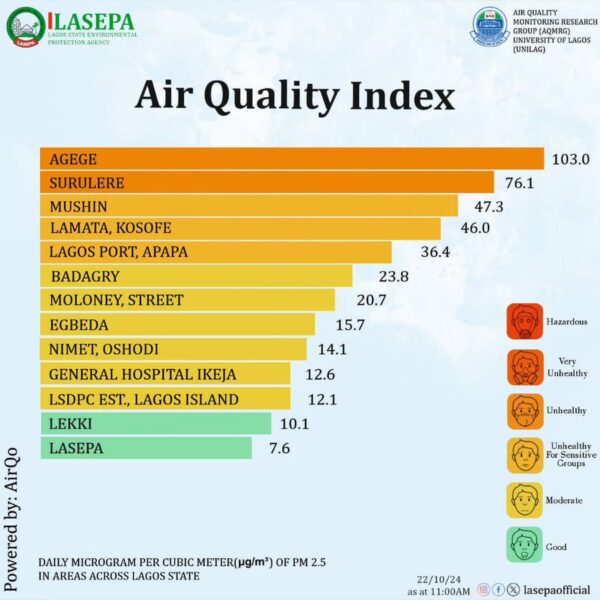The Lagos State Environmental Protection Agency (LASEPA) has released alarming data about air quality in the city.
In their latest Air Quality Index for October 2024, Agege and Surulere are identified as the areas with the worst air quality in Lagos State.
This report was shared on LASEPA’s verified X page on Tuesday, highlighting serious health risks for residents.
Agege recorded the most hazardous air quality level, with a shocking rating of 103 percent.
This level of pollution is categorized as “hazardous,” indicating it poses a severe threat to public health.
Surulere follows closely with a “very unhealthy” rating of 76.1 percent.
Residents in these areas are faced with increased health risks due to the high levels of air pollution.
“This is a wake-up call for everyone living in these neighborhoods,” said Dr. Amina Yusuf, an environmental health expert.
“The air quality is not just a number; it affects our health, especially for vulnerable groups like children and the elderly.”
Other areas with concerning air quality levels include Mushin, which scored 47.3 percent, classified as “unhealthy,” and LAMATA Kosefe, which received a score of 46 percent, also deemed “unhealthy.”
The pollution crisis extends to Apapa, home to the Lagos Port, where air quality was rated at 36.4 percent, categorized as unhealthy.
“Apapa’s air quality is affected by heavy traffic and industrial activities,” noted Dr. Yusuf.
The situation in Badagry and Moloney Street is also alarming, with scores of 23.8 percent and 20.7 percent, respectively.
Both areas are classified as unhealthy for sensitive groups, which include individuals with pre-existing health conditions.
In contrast, Egbeda recorded a score of 15.7 percent, while NIMET Oshodi followed with 14.1 percent, both categorized as moderate.
This moderate classification means the air quality is acceptable for the general public but may still pose risks for sensitive groups.
On the brighter side, Lekki emerged as the area with the best air quality, scoring 10.1 percent, which is considered good.
LASEPA even rated its own air quality at 7.6 percent, also in the good category.
However, these positive ratings do little to mask the dire situation in Agege and Surulere.
The findings of LASEPA are part of ongoing efforts to monitor and improve air quality in Lagos.
The agency has been working to increase public awareness about air pollution and its effects on health.
“This report highlights the need for immediate action to combat pollution,” said LASEPA spokesperson, Chijioke Nwosu.
“Residents must be aware of the dangers of poor air quality and take necessary precautions.”
The report also suggests that residents in high-pollution areas limit outdoor activities, especially during peak pollution times.
“I urge everyone, especially those living in Agege and Surulere, to stay indoors as much as possible,” said Dr. Yusuf.
“The impact of air pollution is not to be underestimated, as it can lead to respiratory diseases and other health problems.”
Environmental activists are calling for more significant government intervention to address the pollution crisis.
“The government must take action to improve air quality in these areas,” stated activist Clara Eze. “We need stricter regulations on industries and vehicles that contribute to pollution.”
LASEPA’s report serves as a crucial reminder of the importance of clean air for public health.
As more people become aware of the issue, there is hope for a collective effort to combat pollution.
“We can all play a part in improving our environment,” said Nwosu. “Simple actions like reducing vehicle use or reporting illegal waste dumping can make a difference.”
The agency also plans to conduct more regular air quality assessments to keep the public informed.
Residents of Agege and Surulere are urged to take care of their health and stay informed about air quality levels.
“We must work together to ensure a healthier Lagos for ourselves and future generations,” concluded Dr. Yusuf.

